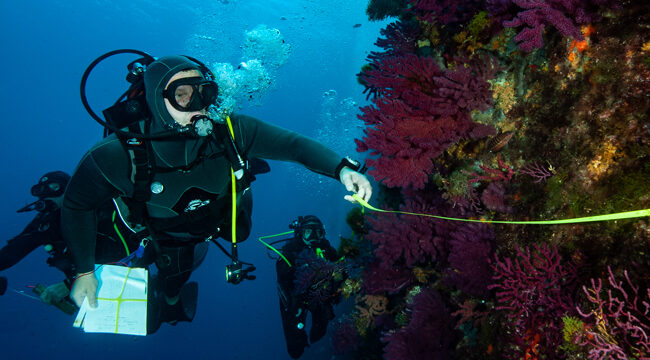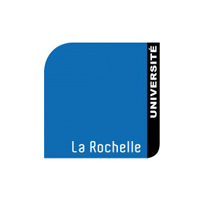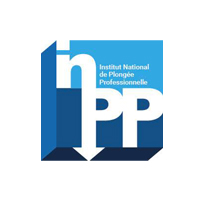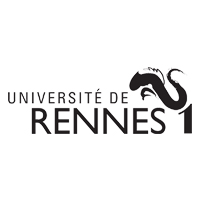PRESENTATION
The training of Scientific Divers aims to lead the trainee to the double qualification of the University Diploma BIOEM (D.U Biosurveillance of Marine Mediterranean Ecosystems – University of La Rochelle) and the CAH1B (Professional diving certificate up to 30m depth – Institut National de la Plongée Professionnelle). It offers to train professional divers, specifically in the implementation of standardized protocols for monitoring coastal Mediterranean ecosystems by scuba diving. It also prepares students for scientific communication.
DESCRIPTION
Based on the courses of the DU BIOEM and CAH1B, the training of scientific diver meets three major educational objectives:
- To train underwater divers, in a scientific approach, to be able to plan and carry out the various stages of projects of inventories and diagnoses of the Mediterranean coastal natural environments, in the context of their management, conservation and valorization.
- To train in scientific mediation in the field.
- To professionalize scuba divers with professional diving courses allowing them to obtain the Certificate of Aptitude for Hyperbarics (CAH – Mention B – Class 1) based on concrete exercises of scientific surveys.
The “Focus on” at the bottom of the page specifies the objectives and educational content of each of the courses.
Septentrion Environnement (SE) coordinates the implementation of the training in conjunction with the training partners (University of La Rochelle, INPP). SE is involved in the distance learning phases of the DU BIOEM and hosts and supervises the classroom and field training courses (DU BIOEM and CAH1B).
The candidate can choose to follow each of the courses separately (DU BIOEM or CAH1B) and will be put in contact with each of the training managers in charge of these courses.
CALENDAR
Annual training – Contact us for more information by email
- The training of DU BIOEM takes place each year from spring to autumn through a mixed session proposing a period of distance learning, followed by a presential training course in June in Marseille.
- The scientific CAH1B consists of a 7-day course offered each year on the sidelines of the DU BIOEM by Septentrion Environnement and INPP trainers. It allows the trainees to approach the various techniques of underwater work within the regulatory framework defined by the Work Ministry.
"BIOEM" courseS and diploma
The University Diploma (DU) Biosurveillance of Mediterranean Marine Ecosystems in Autonomous Diving (BIOEM) trains (future) actors in marine ecology and field survey methods. With a predominantly field approach, it allows students to specialize in the implementation of a complete scientific approach, from the definition and realization of study protocols for coastal Mediterranean ecosystems to the analysis and interpretation of data. It also includes the acquisition of skills in environmental mediation.
For more information, visit:
https://formations.univ-larochelle.fr/du-bioem
Registration and information from the University of La Rochelle’s continuing education department:
formationcontinue@univ-lr.fr
"CAH1B" courses and diploma
The Certificate of Aptitude for Hyperbarics (CAH – Mention B – Class 1) aims to train in the safetý of workers exposed to hyperbaric risks, as well as in the preparation, organization, evaluation and prevention of a hyperbaric intervention with immersion up to 30m in compliance with the decree of 30/10/2012 and the decree of 12/12/2016 allowing to obtain a hyperbaric qualification allowing to exercise a professional activity during scientific and technical underwater interventions.
For more information:
http://inpp.org/wp-content/uploads/2019/03/fiche-programme-1bv3docx.pdf



